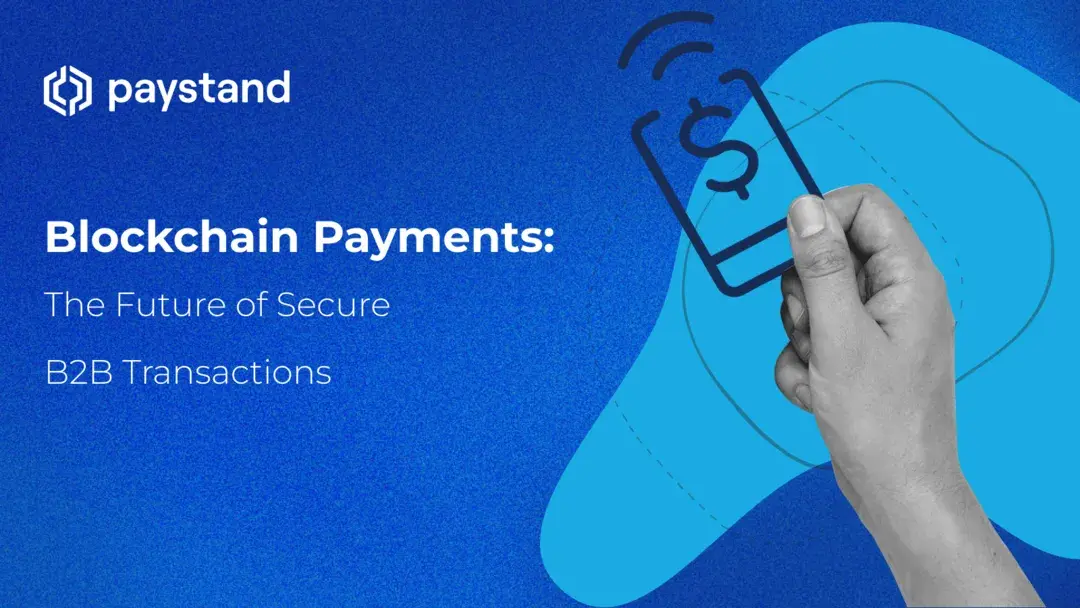Blockchain Payments: The Future of Secure B2B Transactions

Table of Contents
- What Are Blockchain Payments?
- What Payment Methods Does Blockchain Accept?
- How Do You Transfer Money Using Blockchain?
- What Are The Risks of Blockchain Payments?
- Does Blockchain Accept Bank Transfers?
- Online Blockchain Payments
- Is Blockchain Right for You?
To most people, blockchain technology is an enigma that only relates to cryptocurrency. However, blockchain has changed from its beginnings in cryptocurrency to make transactions easier in B2B payments and other situations, simplifying business transactions.
Today, this technology isn't just for crypto payment gateways. It's been adopted for secure and accurate transactions. Blockchain can reduce 30% of banks' infrastructure costs. And so far, blockchain technology has processed over $270B in transactions.
In this article, we'll discuss blockchain payment processing's advantages over traditional methods and why blockchain is the future of B2B payments.
Key Takeaways
- Blockchain technology, originally linked to cryptocurrency, has evolved to streamline various types of transactions, including B2B payments.
- Blockchain payments offer enhanced security, transparency, efficiency, and cost-effectiveness compared to traditional methods.
- The blockchain accepts payment methods such as cryptocurrencies, stablecoins, blockchain-based payment gateways, decentralized exchanges, and NFTs.
- Risks associated with blockchain payments include regulatory uncertainty, security vulnerabilities, volatility, scalability issues, lack of consumer protections, technical complexity, energy consumption, interoperability issues, and privacy concerns.
- While blockchain does not directly facilitate bank transfers, platforms exist to bridge traditional banking and blockchain, enabling seamless conversion between fiat currency and digital assets.
- Blockchain payments may offer significant advantages for B2B businesses seeking better security and data transparency, even without directly accepting cryptocurrencies.
What are Blockchain Payments?
Blockchain payments are a new and innovative way to send and receive money. They are based on blockchain technology, a distributed database that records transactions. This makes blockchain payments more secure and transparent than traditional payment methods.
Benefits of Blockchain Payments
- Security: Blockchain payments are very secure because they are based on cryptography. This means that they are protected from fraud and theft.
- Transparency: All blockchain transactions are recorded on the blockchain, which is a public ledger. This makes it easy to track and audit payments.
- Efficiency: Blockchain payments are processed quickly and efficiently because they do not rely on intermediaries like banks or credit card companies.
- Cost-effectiveness: Blockchain payments are typically less expensive than traditional payment methods. This is because there are no transaction fees or other hidden costs.
What Payment Methods Does Blockchain Accept?
Blockchain technology underpins various cryptocurrencies and offers a secure and decentralized method for recording transactions. Understanding the payment methods accepted by blockchain is crucial for those seeking to engage with this revolutionary technology.
- Cryptocurrencies: Blockchain is linked to cryptocurrencies like Bitcoin and Ethereum. These cryptocurrencies can be used for payments on the blockchain, but their volatility and regulatory issues affect their practicality as payment methods.
- Stablecoins: Stablecoins are cryptocurrencies pegged to fiat currencies, providing a stable transaction alternative and reducing volatility. Examples include Tether (USDT) and USD Coin (USDC).
- Blockchain-Based Payment Gateways: Blockchain payment gateways enable merchants to accept cryptocurrency payments, converting them into fiat or stablecoins in real time. Examples include Coinbase Commerce and BitPay.
- Decentralized Exchanges (DEXs): DEXs like Uniswap and PancakeSwap facilitate direct cryptocurrency trading without centralized platforms, offering alternative payments within the blockchain ecosystem.
- Non-Fungible Tokens (NFTs): NFTs, unique digital assets representing various items, can be purchased using cryptocurrencies on NFT marketplaces like OpenSea and Rarible, expanding the scope of blockchain payments.
How Do You Transfer Money Using Blockchain?
- Initiate the Transaction: The sender initiates the money transfer by creating a blockchain transaction with the recipient's address, amount, and unique ID.
- Verifying the Transaction: Transaction broadcast to network nodes to verify the validity and sender's funds.
- Adding the Transaction to a Block: After verification, transactions are added to a block with a unique hash based on its data.
- Adding the Block to the Chain: The validated block is added to the blockchain, and the transaction is confirmed and visible to all network participants.
- Settlement of Funds: Once added to the blockchain, transactions are final and irreversible, and funds transfer from sender to recipient.
- Confirmation and Immutability: The blockchain network verifies and confirms transactions, making them resistant to alteration or deletion, ensuring transaction integrity.
What Are The Risks Of Blockchain Payments?
Blockchain payments offer many benefits, such as increased transparency, security, and efficiency. However, there are also several risks associated with using blockchain for payments:
- Regulatory Uncertainty: The regulatory environment for blockchain and cryptocurrencies is still evolving. Countries have different rules and regulations, which can create legal uncertainty for businesses and individuals using blockchain payments.
- Security Vulnerabilities: While blockchain technology is generally secure, it is not immune to attacks. Hacks and security breaches can occur at various points, such as cryptocurrency exchanges, wallets, and even smart contracts. If a vulnerability is exploited, it can lead to significant financial losses.
- Volatility: Cryptocurrencies, often used in blockchain payments, are known for their price volatility. The value of digital assets can fluctuate significantly over short periods, posing a risk to financial stability and predictability for both consumers and businesses.
- Scalability Issues: Many blockchain networks face scalability challenges, which can lead to slow transaction times and high fees, especially during periods of high demand. This can hinder the practical use of blockchain for everyday payments.
- Lack of Consumer Protections: Unlike traditional payment systems, blockchain payments often lack consumer protection mechanisms like chargebacks and fraud prevention. Once a transaction is made, it is typically irreversible, which can be problematic in cases of fraud or error.
- Technical Complexity: The technical complexity of blockchain technology can be a barrier to entry for many users. Understanding how to securely manage digital assets, use wallets, and engage with blockchain networks requires technical knowledge.
- Energy Consumption: Some blockchain networks consume significant energy, particularly those using proof-of-work consensus mechanisms. This can raise environmental concerns and lead to negative public perception.
- Interoperability Issues: There are many different blockchain platforms, and not all of them are compatible with each other. This lack of interoperability can limit the functionality and usefulness of blockchain payments, as users may find it challenging to transact across different platforms.
- Privacy Concerns: While blockchain offers transparency, it can also raise privacy concerns. In public blockchains, transaction data is visible to everyone, which can lead to worries about financial privacy and data security.
Does Blockchain Accept Bank Transfers?
Blockchain technology doesn't directly handle bank transfers, but various platforms and services facilitate interactions between traditional banking systems and blockchain networks. For example, cryptocurrency exchanges often allow users to fund their accounts via bank transfers, enabling them to purchase cryptocurrencies recorded on a blockchain. Additionally, fiat-to-crypto payment gateways and services provide a means to convert traditional currency into digital assets, often accepting bank transfers as a payment method.
Furthermore, stablecoins can be obtained through bank transfers and used within blockchain ecosystems. Some blockchain projects and fintech companies also work on solutions to bridge the gap between traditional banking and blockchain, enabling direct transfers from bank accounts to blockchain wallets. Thus, while blockchain doesn't accept bank transfers, these integrations allow seamless transitions between traditional and digital finance.
Online Blockchain Payments
Making payments online using blockchain involves using cryptocurrencies or blockchain-based platforms to transfer value. Here’s a brief overview of how you can make online payments with blockchain:
Using Cryptocurrencies
- Digital Wallet: To make a payment, you need a digital wallet that holds your cryptocurrency. Wallets can be software-based (mobile apps, desktop software) or physical devices.
- Payment Address: When making a purchase, you'll need the recipient's wallet address, which is a unique identifier for their wallet.
- Transaction Process: You initiate the payment by entering the recipient's address and the amount to be sent to your wallet. You then authorize the transaction with your private key. The transaction is then broadcast to the blockchain network, validated, and added to the blockchain.
Blockchain Payment Processors
- Services: Some businesses use blockchain payment processors, like BitPay, CoinGate, or Coinbase Commerce, to accept cryptocurrency payments. These processors facilitate the transaction, often allowing the company to convert the cryptocurrency into fiat currency.
- Integration: For online merchants, these processors can be integrated into their website or app, enabling seamless payments.
Smart Contracts
- Automated Payments: Some blockchain platforms allow for smart contracts. These can automate payments based on predefined conditions and are useful for subscriptions, escrow services, or complex transactions.
DeFi Platforms
- Direct Transfers: Some DeFi platforms facilitate direct transfers between users and offer various financial services, including payments, lending, and more.
To make a blockchain payment online, ensure you have the correct recipient address and sufficient funds and understand any fees or conversion rates involved. The process can vary slightly depending on the cryptocurrency and platform used.
The Profit Paradigm Podcast
We're flipping the script on finance. No fees. No friction. Just pure cash-flow power. If you're ready to automate, accelerate, and take control of your revenue, this is where the future of money movement begins.
Is Blockchain Right for You?
We've listed some serious blockchain advantages for payment processing. But is it the right thing for your B2B business? Choosing a blockchain payment solution doesn't mean you need to accept crypto payments. You get the best part of both worlds.
To learn more about blockchain as a payment option, we encourage you to read our eBook on Why B2B Companies Need to Adopt Blockchain Payments. In it, we answer some pressing questions on how blockchain can improve your transactions and integrate into your system.







